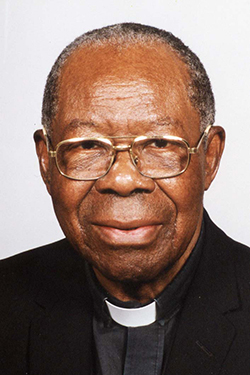The world’s first African-American Divine Word Missionary brother goes to eternal rest
Brother Vincent (Louis) Webb, 1908-2005

Brother Vincent Webb, 97, died at Divine Word Residence in Techny, Ill., on Dec. 22, 2005.
In 1937, Brother Vincent became the first African-American brother to profess vows in the Society of the Divine Word. He served the Church as a brother for 68 years.
Brother Vincent was born Louis Webb. A native of Fordyce, Ark., he was the seventh of Wesley and Ella Webb’s ten children. He attended a community school in Fordyce, where a teacher was hired for only three months of the year.
In 1925, at age 17, he went north to Toledo, Ohio, to work in a creosote plant. Raised in the Baptist faith, Brother Vincent had never heard of Catholics, much less met one. According to Brother Vincent, there just weren’t any Catholics in the black community in Arkansas at that time. The owner of the creosote plant, a Catholic, invited him to Mass at St. Patrick’s Church.
Brother Vincent remembered, "Before I walked into St. Patrick’s Church in Toledo, I had never seen a crucifix. When I looked up at that life-sized crucifix, something just happened to me." He kept going back to St. Patrick's, and was baptized later that year. Before long, he decided that he wanted to become a priest.
At the time, the only Catholic seminary in the United States that would accept African-American men as candidates for the priesthood was the Society of the Divine Word’s St. Augustine’s Seminary in Bay St. Louis, Miss. It had opened in 1923 specifically to educate African-American men for the priesthood. In turn, they would seek converts among the poor African-American population in the rural South.
In 1928, Louis Webb applied and was accepted at St. Augustine’s Seminary, but because of his lack of formal education, he could not keep up with the demands of the courses. He went back to Toledo after one year and continued to work in the creosote plant.
In 1934, he began again to apply for admission to other religious communities. Time after time, he was turned down, and he became mightily discouraged. He said he wondered what he had done that he could not be accepted anywhere. He stopped going to church for about three months. The priests at St. Patrick’s wrote to every religious community in the United States on his behalf, but, it seemed, none would accept an African-American candidate.
That year, the Society of the Divine Word was given permission by Rome to accept black candidates for the religious brotherhood at Bay St. Louis.
In 1934, Brother Vincent, who attributes his perseverance to grace, entered the brothers’ program at St. Augustine’s Seminary. He professed first vows in 1937, and was thereafter known as Brother Vincent Webb, a name he retained in honor of St. Vincent de Paul. "I read about how St. Vincent de Paul went around helping the poor in Paris. I liked that, and I wanted to imitate him," Brother Vincent told friends.
Brother Vincent’s first assignment was to take charge of the laundry and cooking for the seminary at Bay St. Louis. That was where he learned to cook in the French Creole manner. "In New Orleans, they like their food hot and their coffee strong," he used to say.
Fifteen years later, in 1952, he was transferred to the Society’s Montreal district in Canada, where he ran a farm and took care of a dairy herd at Granby, Québec for seven years. "That was the hardest assignment to give up," he once said with evident regret, "but I had taken a vow of obedience, and I was needed elsewhere."
For the next six years, from 1960 to 1966, he did the cooking at the Society’s community in Bordentown, N.J., and in Pittsburgh. Despite his liking for Creole cooking and chicory coffee, he always learned to cook in the style in which the community liked its food.
In 1966, Brother Vincent was assigned to Divine Word Seminary in Riverside, Calif., where he plied his culinary skills for the next 31 years before retiring to Techny. In 1996, he suffered knee injuries that confined him to a wheelchair. His response to this misfortune was, "My hands are still good, so I’ll volunteer to peel the potatoes for the community." He also helped by sorting stamp collections to help the missions.
Return to Main Obituaries page